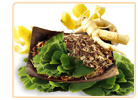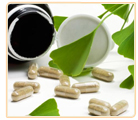Uses of Ginkgo Biloba
 Ginkgo biloba has been used in Chinese herbal medicine for centuries. The medicinal properties found in Ginkgo seeds and leaves have long been used to treat ailments such as bronchitis, asthma, coughs, high blood pressure, and headaches. Ginkgo biloba has been used in Chinese herbal medicine for centuries. The medicinal properties found in Ginkgo seeds and leaves have long been used to treat ailments such as bronchitis, asthma, coughs, high blood pressure, and headaches.
However, it is memory and circulatory benefits that are most commonly associated with the Ginkgo biloba herb. Because menopausal women often suffer from circulatory and memory disorders, Ginkgo remains a popular choice of herbal remedy. Continue reading to find out more about the different uses of Ginkgo biloba.
Modern Day Uses
Today, Ginkgo biloba is generally used in the form of a concentrated, standardized leaf extract known as Ginkgo biloba extract (GBE). GBE comes in various forms -view the different forms in this list ; and research shows that GBE is more successful in treating ailments than the non-standardized leaf alone.
Ginkgo biloba helps relieve some menopausal symptoms. It is a brain stimulant that:
. Improves memory capacity
. Supports cognitive function
. Enhances concentration
. Increases strength
Ginkgo is also known as a tonic herb - one that restores balance to the body. For example, it can give people energy if they�re feeling tired or help them relax if they�re feeling anxious.
How Ginkgo biloba Works
Ginkgo biloba improves blood flow to the brain and other major organs. It boosts oxygen levels in the brain and improves concentration, which is important for menopausal women who often suffer from memory lapses. Ginkgo biloba also benefits women looking for relief from ailments related to menopause, such as osteoporosis.
Ginkgo is an antioxidant and it helps to reduce the number of free radicals in the body. Free radicals are reactive particles that damage organs and tissues, cause premature aging, and can lead to serious conditions such as cancer, strokes, and Alzheimer�s. Below is a list of other disorders that can be eased by taking Ginkgo biloba:
 . Tinnitus . Tinnitus
. Reynaud's disease
. Intermittent claudication
. Poor mood
. Loss of libido
. Sleep disturbances
. Macular degeneration
Different Ginkgo Products
 Tea: Ginkgo biloba tea is made from Ginkgo leaves and helps boost the memory performance of the drinker. Tea: Ginkgo biloba tea is made from Ginkgo leaves and helps boost the memory performance of the drinker.
Extract: Ginkgo biloba leaf extract is used to make supplements and comes in the form of capsules, tablets, and liquid extract. The Ginkgo biloba diet supplement is a top-seller in the US. Ginkgo biloba vitamins are also made from Ginkgo extract.
Powder: The Ginkgo leaf is dried and ground into a fine powder and can be mixed with water, milk or juice for easier consumption.
Skin products: It is also possible to find Ginkgo extract in certain skin products.
Ginkgo biloba as a Replacement for HRT
 Adverse side effects from hormone replacement therapy (HRT), such as irregular bleeding and increased risk of breast cancer, are prompting many women to choose herbal remedies instead. Research shows that the standardized Ginkgo extract has estrogenic activity and may be an appropriate substitute for HRT. Because Ginkgo contains phytoestrogens, plant chemicals which act in a similar way to estrogen, it raises hormone levels by replacing human hormones with plant substitutes. Adverse side effects from hormone replacement therapy (HRT), such as irregular bleeding and increased risk of breast cancer, are prompting many women to choose herbal remedies instead. Research shows that the standardized Ginkgo extract has estrogenic activity and may be an appropriate substitute for HRT. Because Ginkgo contains phytoestrogens, plant chemicals which act in a similar way to estrogen, it raises hormone levels by replacing human hormones with plant substitutes.
Despite these beneficial effects, many scientists question the safety of the Ginkgo biloba herb and believe more research is needed into its success. Women taking Ginkgo may be prone to developing breast cancer and other conditions because it contains phytoestrogens.
Ginkgo biloba and Other Herbs
 There are various herbs which can be taken with Ginkgo. Ginseng is another antioxidant and many health care professionals claim that combining Ginseng and Ginkgo increases their beneficial effects. Ginkgo and ginseng work together to help improve concentration, enhance memory performance, and minimize the effects of stress, which is great news for menopausal women. Ginkgo biloba also works with hawthorn, sage, rosemary, and gotu kola to boost memory function. There are various herbs which can be taken with Ginkgo. Ginseng is another antioxidant and many health care professionals claim that combining Ginseng and Ginkgo increases their beneficial effects. Ginkgo and ginseng work together to help improve concentration, enhance memory performance, and minimize the effects of stress, which is great news for menopausal women. Ginkgo biloba also works with hawthorn, sage, rosemary, and gotu kola to boost memory function.
Ginkgo Dosage
Ginkgo biloba dosage in tablet form depends on the patient�s condition. To determine the correct dosage, it�s best to consult a doctor or pharmacist because taking too little can prove ineffective and taking too much may lead to side effects. It�s worth remembering that the strength of purity of the Ginkgo biloba herb in tablet form will differ between suppliers.
With Ginkgo tea, measures are metered for safe usage. Drinkers should follow the dosage instructions provided on the products packaging. Usually two to four bags per day are recommended.
In powder format, Ginkgo should be taken in one teaspoon doses, up to three times per day, depending on the condition.
 Generally speaking, the average daily dosage of Ginkgo biloba is between 40mg and 240 mg, split into two or three doses. Generally speaking, the average daily dosage of Ginkgo biloba is between 40mg and 240 mg, split into two or three doses.
Ginkgo seeds are toxic and should not be consumed. To read more about the side effects of Ginkgo biloba click here.
Ginkgo Overdose
Ginkgo biloba is a natural remedy but it is possible to take too much. As a phytoestrogenic herb, Ginkgo can sometimes have side effects, so it�s best to follow the recommended dosage listed on the packaging. Overdosing on Ginkgo can result in symptoms such as:
. Nausea and vomiting
. Cramps
. Restlessness
. Sexual dysfunction
. Irritability
. Diarrhea
. Spasms
. Seizures
. Bleeding, e.g. nosebleeds (this is a rare problem)
A doctor or healthcare professional should be contacted in the case of an overdose.
Now that the uses of Ginkgo biloba have been explained. Click on the link provided to read the next section to better understand the benefits of Ginkgo.
Conclusion about the uses of Ginkgo biloba
Ginkgo biloba is useful for treating some symptoms of menopause. Its main uses are in boosting circulation and memory performance, which are often problematic for women going through menopause. However, despite these beneficial effects, many scientists question the safety of the Ginkgo biloba herb and believe more research is needed into its uses and success.
Which herb should women try? Today women are looking for relief from their menopause symptoms with herbs. Phytoestrogenic herbs and non-estrogenic herbs are good in relieving menopause symptoms, but recent studies show that non-estrogenic herbs have no side effects because they help the body to produce its own hormones instead of introducing hormones like the phytoestrogenic ones. Learn more about non-estrogenic herbs for menopause.
| 

